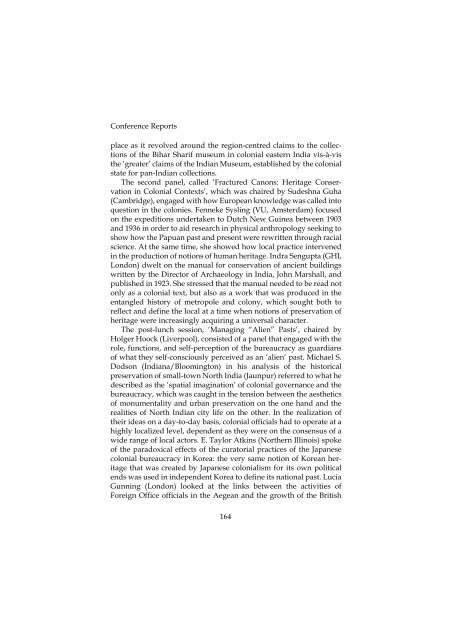Download - German Historical Institute London
Download - German Historical Institute London
Download - German Historical Institute London
You also want an ePaper? Increase the reach of your titles
YUMPU automatically turns print PDFs into web optimized ePapers that Google loves.
Conference Reports<br />
place as it revolved around the region-centred claims to the collections<br />
of the Bihar Sharif museum in colonial eastern India vis-à-vis<br />
the ‘greater’ claims of the Indian Museum, established by the colonial<br />
state for pan-Indian collections.<br />
The second panel, called ‘Fractured Canons: Heritage Con ser -<br />
vation in Colonial Contexts’, which was chaired by Sudeshna Guha<br />
(Cambridge), engaged with how European knowledge was called into<br />
question in the colonies. Fenneke Sysling (VU, Amsterdam) focused<br />
on the expeditions undertaken to Dutch New Guinea be tween 1903<br />
and 1936 in order to aid research in physical anthropology seeking to<br />
show how the Papuan past and present were rewritten through racial<br />
science. At the same time, she showed how local practice intervened<br />
in the production of notions of human heritage. Indra Sengupta (GHI,<br />
<strong>London</strong>) dwelt on the manual for conservation of ancient buildings<br />
written by the Director of Archaeology in India, John Marshall, and<br />
published in 1923. She stressed that the manual needed to be read not<br />
only as a colonial text, but also as a work that was produced in the<br />
entangled history of metropole and colony, which sought both to<br />
reflect and define the local at a time when notions of preservation of<br />
heritage were increasingly acquiring a universal character.<br />
The post-lunch session, ‘Managing “Alien” Pasts’, chaired by<br />
Holger Hoock (Liverpool), consisted of a panel that engaged with the<br />
role, functions, and self-perception of the bureaucracy as guardians<br />
of what they self-consciously perceived as an ‘alien’ past. Michael S.<br />
Dodson (Indiana/Bloomington) in his analysis of the historical<br />
preservation of small-town North India (Jaunpur) referred to what he<br />
described as the ‘spatial imagination’ of colonial governance and the<br />
bureaucracy, which was caught in the tension between the aesthetics<br />
of monumentality and urban preservation on the one hand and the<br />
realities of North Indian city life on the other. In the realization of<br />
their ideas on a day-to-day basis, colonial officials had to operate at a<br />
highly localized level, dependent as they were on the consensus of a<br />
wide range of local actors. E. Taylor Atkins (Northern Illinois) spoke<br />
of the paradoxical effects of the curatorial practices of the Japanese<br />
colonial bureaucracy in Korea: the very same notion of Korean heritage<br />
that was created by Japanese colonialism for its own political<br />
ends was used in independent Korea to define its national past. Lucia<br />
Gunning (<strong>London</strong>) looked at the links between the activities of<br />
Foreign Office officials in the Aegean and the growth of the British<br />
164













